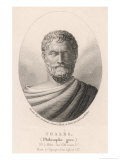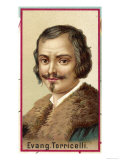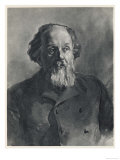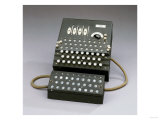|
|
|
|
|
Thales of Miletus
fl. 620-540 BC; Miletus, Ionian Greek, Asia Minor
The philosopher and mathematician Thales, known as the “Father of Science”, rejected mythological explanations of natural phenomenon and defined general principles essential for the scientific processing of thought.
• Inner Logodynamics in Thales of Miletus
|
|
|
|
Evangelista Torricelli
b. 10-15-1608; Faenza, Romagna (present-day Italy)
d. 10-25-1647; Florence
Torricelli was an Italian mathematician and physicist most noted for inventing the Barometer (1642) and for stating Torricelli's Law concerning the speed of a fluid flowing out of an opening, later shown to be a particular case of Bernoulli's principle. He succeeded Galileo as the grand-ducal mathematician and professor of mathematics in the University of Pisa.
• weather posters
|
|
|
|
Konstantin Tsiolkovsky
b. 9-17-1857; Izhevskoye, Russian Empire
d. 9-19-1935
Konstantin Eduardovich Tsiolkovsky, Russian scientist and pioneer of space travel, earned a living as a math teacher. The television series, Star Trek: The Next Generation honored him by naming a fictional space ship the K. E. Tsiolkovsky.
|
|
|
|
Alan Turing
b. 6-23-1912; London, England
d. 6-7-1954; England
Mathematician, logician, cryptanalyst and computer scientist Alan Turing was highly influential in the development of computer science with his description of a theoretical device, the “Turing machine”, that would play a significant role understanding the limitations of mechanical computing.
During World War II Turing “devised a number of techniques for breaking German ciphers, including the method of the bombe, an electromechanical machine that could find settings for the Enigma machine.”
Alan Turing quotes ~
• “Mathematical reasoning may be regarded rather schematically as the exercise of a combination of two facilities, which we may call intuition and ingenuity.”
• “A man provided with paper, pencil, and rubber, and subject to strict discipline, is in effect a universal machine.”
• “The idea behind digital computers may be explained by saying that these machines are intended to carry out any operations which could be done by a human computer.”
• “I believe that at the end of the century the use of words and general educated opinion will have altered so much that one will be able to speak of machines thinking without expecting to be contradicted.”
• “Science is a differential equation. Religion is a boundary condition.”
• “We can only see a short distance ahead, but we can see plenty there that needs to be done.”
• “A very large part of space-time must be investigated, if reliable results are to be obtained.”
• “I am not very impressed with theological arguments whatever they may be used to support. Such arguments have often been found unsatisfactory in the past.”
• The Annotated Turing: A Guided Tour Through Alan Turing's Historic Paper on Computability and the Turing Machine
|
|
|
|
Alfred North Whitehead
b. 2-15-1861; Ramsgate, Kent, England
d. 12-30-1947; Cambridge, MA
Alfred North Whitehead is best remembered as a mathematician, philosopher and educator. He collaborated with Bertrand Russell on Principia Mathematica, an attempt to ground mathematics on logic.
Quote from poster: “Disinterested scientific curiosity is a passion for an ordered intellectual vision of the connection events. But the goal of such curiosity is the marriage of action to thought. This essential intervention of action even in abstract science is often overlooked. No man of science want merely to know. He aquires knowledge to appease his passion for discovery. He does not discover in order to know, he knows in order to discover. The pleasure which art and science can give to toil is the enjoyment which arises from successfully directed intention. Also it is the same pleasure which is yielded to the scientist and to the artist.” The Aims of Education, 1947
Alfred North Whitehead quotes ~
• “Almost all new ideas have a certain aspect of foolishness when they are first produced.”
• “The silly question is the first intimation of some totally new development.”
• “Art is the imposing of a pattern on experience, and our aesthetic enjoyment is recognition of the pattern.”
• “Art attracts us only by what it reveals of our most secret self.”
• “Fools act on imagination without knowledge, pedants act on knowledge without imagination.”
• “If a dog jumps into your lap, it is because he is fond of you; but if a cat does the same thing, it is because your lap is warmer.”
• “Familiar things happen, and mankind does not bother about them. It requires a very unusual mind to undertake the analysis of the obvious.”
• “Intelligence is quickness to apprehend as distinct form ability, which is capacity to act wisely on the thing apprehended.”
• “Life is an offensive, directed against the repetitious mechanism of the Universe.”
• “Speak out in acts; the time for words has passed, and only deeds will suffice.”
• “The art of progress is to preserve order amid change and to preserve change amid order.”
• “Culture is activity of thought, and receptiveness to beauty and humane feeling. Scraps of information have nothing to do with it.”
|
|
|
|
|
|
|
previous page | top
mathematics | mathematicians list | a-b | c | d | e | f-g | h-k | l-m | n | o-p-q | r-s | T-Z < numbers
|
|
I have searched the web for visual, text, and manipulative curriculum support materials - teaching posters, art prints, maps, charts, calendars, books and educational toys featuring famous people, places and events - to help teachers optimize their valuable time and budget.
Browsing the subject areas at NetPosterWorks.com is a learning experience where educators can plan context rich environments while comparing prices, special discounts, framing options and shipping from educational resources.
Thank you for starting your search for inspirational, motivational, and educational posters and learning materials at NetPosterWorks.com. If you need help please contact us.
|
|
|



















